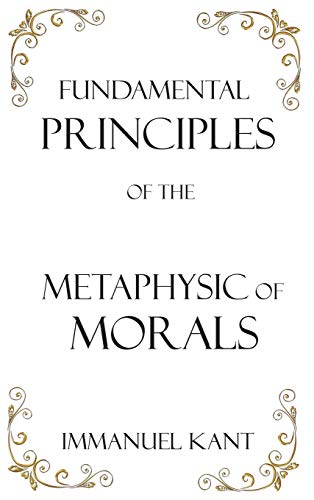Verwandte Artikel zu Fundamental Principles of the Metaphysic of Morals

Inhaltsangabe
Kant conceives his investigation as a work of foundational ethics-one that clears the ground for future research by explaining the core concepts and principles of moral theory and showing that they are normative for rational agents. Kant conceives his investigation as a work of foundational ethics—one that clears the ground for future research by explaining the core concepts and principles of moral theory and showing that they are normative for rational agents. Kant aspires to nothing less than this: to lay bare the fundamental principle of morality and show that it applies to us. In the text, Kant provides a groundbreaking argument that the rightness of an action is determined by the character of the principle that a person chooses to act upon. Kant thus stands in stark contrast to the moral sense theories and teleological moral theories that dominated moral philosophy at the time he was writing. Central to the work is the role of what Kant refers to as the categorical imperative, the concept that one must act only according to that precept which he or she would will to become a universal law.
Die Inhaltsangabe kann sich auf eine andere Ausgabe dieses Titels beziehen.
Reseña del editor
Kant conceives his investigation as a work of foundational ethics-one that clears the ground for future research by explaining the core concepts and principles of moral theory and showing that they are normative for rational agents. Kant conceives his investigation as a work of foundational ethics—one that clears the ground for future research by explaining the core concepts and principles of moral theory and showing that they are normative for rational agents. Kant aspires to nothing less than this: to lay bare the fundamental principle of morality and show that it applies to us. In the text, Kant provides a groundbreaking argument that the rightness of an action is determined by the character of the principle that a person chooses to act upon. Kant thus stands in stark contrast to the moral sense theories and teleological moral theories that dominated moral philosophy at the time he was writing. Central to the work is the role of what Kant refers to as the categorical imperative, the concept that one must act only according to that precept which he or she would will to become a universal law.
„Über diesen Titel“ kann sich auf eine andere Ausgabe dieses Titels beziehen.
EUR 3,41 für den Versand innerhalb von/der USA
Versandziele, Kosten & DauerNeu kaufen
Diesen Artikel anzeigenGratis für den Versand innerhalb von/der USA
Versandziele, Kosten & DauerSuchergebnisse für Fundamental Principles of the Metaphysic of Morals
Fundamental Principles of the Metaphysic of Morals
Anbieter: Books From California, Simi Valley, CA, USA
hardcover. Zustand: Very Good. Artikel-Nr. mon0003635697
Anzahl: 1 verfügbar
Fundamental Principles of the Metaphysic of Morals
Anbieter: PBShop.store US, Wood Dale, IL, USA
HRD. Zustand: New. New Book. Shipped from UK. Established seller since 2000. Artikel-Nr. DB-9781950330171
Anzahl: 1 verfügbar
Fundamental Principles of the Metaphysic of Morals
Anbieter: PBShop.store UK, Fairford, GLOS, Vereinigtes Königreich
HRD. Zustand: New. New Book. Shipped from UK. Established seller since 2000. Artikel-Nr. DB-9781950330171
Anzahl: 1 verfügbar
Fundamental Principles of the Metaphysic of Morals
Anbieter: Ria Christie Collections, Uxbridge, Vereinigtes Königreich
Zustand: New. In. Artikel-Nr. ria9781950330171_new
Anzahl: Mehr als 20 verfügbar
Fundamental Principles of the Metaphysic of Morals
Anbieter: AHA-BUCH GmbH, Einbeck, Deutschland
Buch. Zustand: Neu. Neuware - Kant conceives his investigation as a work of foundational ethics-one that clears the ground for future research by explaining the core concepts and principles of moral theory and showing that they are normative for rational agents. Kant conceives his investigation as a work of foundational ethicsone that clears the ground for future research by explaining the core concepts and principles of moral theory and showing that they are normative for rational agents. Kant aspires to nothing less than this: to lay bare the fundamental principle of morality and show that it applies to us. In the text, Kant provides a groundbreaking argument that the rightness of an action is determined by the character of the principle that a person chooses to act upon. Kant thus stands in stark contrast to the moral sense theories and teleological moral theories that dominated moral philosophy at the time he was writing. Central to the work is the role of what Kant refers to as the categorical imperative, the concept that one must act only according to that precept which he or she would will to become a universal law. Artikel-Nr. 9781950330171
Anzahl: 2 verfügbar

